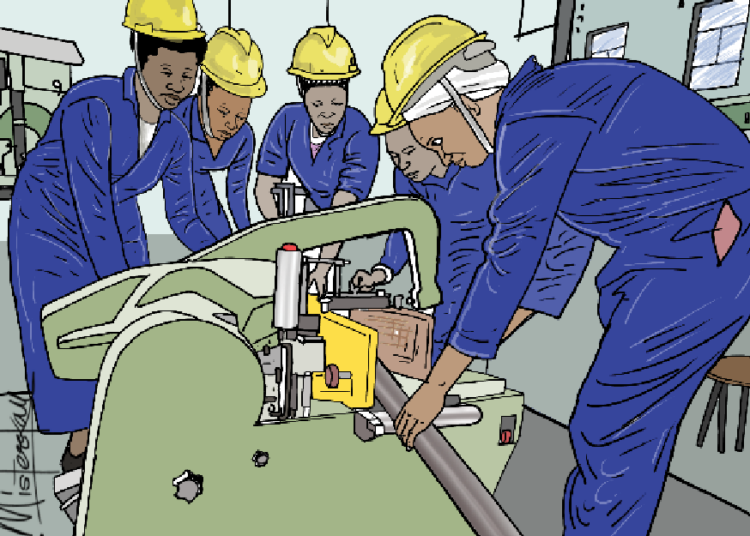Amidst global challenges that are made worse by the absence of effective skill acquisition in the country, governments at all levels have not let down the gauntlet in improving technical education and vocational skill training programmes.
Emphasis is now placed on the need to provide skills and transform our teeming youths employable where people have degrees but no skills to contribute for development. Leading the current efforts at not only changing the narrative on technical education, but also brightening the light in enthroning a new culture of demonstrating regulatory performance is the National Board for Technical Education (NBTE), headed by Professor Idris Muhammad Bugaje. As the executive secretary of the board, he has worked to shore up polytechnics education to an enviable position.
Enhancing Regulations
Bugaje has achieved this through ensuring a world-class polytechnic education through deploying a fault-free accreditation of technical programmes. In improving polytechnic education, the NBTE has walked the path of combating negative practices that made polytechnic education play second fiddle. Realising that the world has changed and emphasis is now placed on skills, the NBTE boss has been in the forefront of improved standards in line with global best practices that promote a paradigm shift from degrees to skill acquisition.
Modern economies are driven by skills, and countries without deploying technical education can’t compete. In accepting the relevance of technical education for Nigeria, the Bugaje-led agency has embraced contemporary trends in pursuing transparent accreditation of programmes that are based on technologically driven platforms devoid of past encumbrances.
In introducing digital endorsement of technical programmes offered in polytechnics and technical schools, the deployment of technology has made it possible for the board to observe real time, both remote and virtual, to check abuses such as borrowing of equipment and procuring the services of lecturers for accreditation purposes. Through the adoption of technology, the NBTE is able to detect the absence of practicals in workshops, including other unwholesome practices that were once the rule, rather than the exception.
In the words of Professor Bugaje, “We are using technology, including Artificial Intelligence (AI) to check on these abuses. In doing these, we have achieved greater efficiency and cut down on cost in transforming the management of technical education in Nigeria. More than any time in history, we have achieved global relevance and pursue efforts that place technical education as the mainstay of development.”
New Frontiers
In advancing the cause of technical education, the board has worked towards implementing efforts aimed at promoting technical education in various parts of the country. Apart from creating six zonal offices that have enhanced the performance of the NBTE, including the digitisation of accreditation exercises, the agency has reviewed and developed about 100 curricula and an equal number of National Occupational Standards for skills training.
Under Bugaje, polytechnic education has fully automated to achieve a paradigm shift, thereby leading to the introduction of mandatory skills qualification for every diploma graduate; revival of the Nigerian Journal of Technical Education and the take-off of the Nigerian Youths Skills Empowerment (NYSE) programme that has enabled Nigerian diploma holders to secure jobs in Denmark and Poland, among other countries.
The admission of Nigeria into World Skills International (WSI), a struggle that started since 2011, has clearly shown NBTE’s quintessence of excellence that led Nigeria to be elected as the continental headquarters of sub-Saharan Africa. This feat was achieved as a direct resolve by the board not to rest on its oars in the promotion of technical and vocational education training. Based on the foregoing, the current management of technical education has been broadened with the understanding and support of both the minister of education and the minister of state for supporting efforts at promoting Technical and Vocational Education and Training (TVET).
According to Professor Bugaje, “Unlike what was obtainable in the past, we now have a minister who tells development partners not to dictate to us but take dictation of our needs. We intend to get NBTE transformed into a National Commission for Technical Education. As it is practiced in South Africa and Ghana, we want HND to be replaced by B.Tech Hons to be awarded by polytechnics.”
Crossing The Hurdles
The executive secretary disclosed that the board has set up a committee to develop a blueprint on China Belt and Road Initiative. He says this is done to “revamp infrastructure as well as modern laboratory and workshop equipment in our polytechnics. All the interventions in airports and road constructions, dams and power generation, among others, will only be sustainable if polytechnics are allowed to train those who will operate and maintain these infrastructure.
For Nigeria to achieve the transformation of our challenged economy, technical and vocational education training is unavoidable. Only through this can mass unemployment plaguing our youths be tackled. Current challenges faced by the nation are clear indicators that Nigeria must emphasise on “skills, not just degrees”, in line with global trends.
The current vision of the NBTE boss has not been without resistance from forces that are used to the old system that is opposed to changes. With increased funding by the government, coupled with Bugaje’s resolution in evolving a new narrative on technical education, there’s no height that can’t be reached in equipping our youths with the requisite technical education and vocational training programmes aimed at empowering the citizens. Most needful, the NBTE must seek to engage development partners for collaboration and funding of critical stakeholders in advancing technical education.











